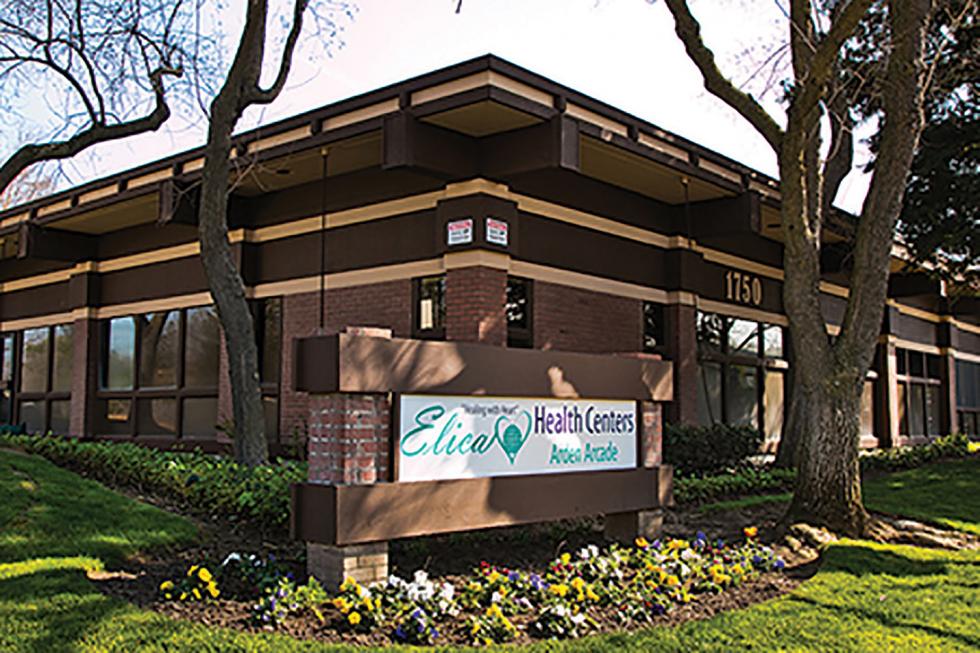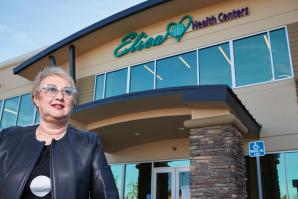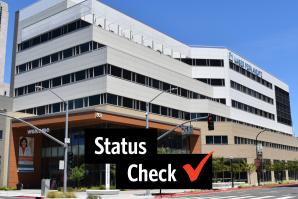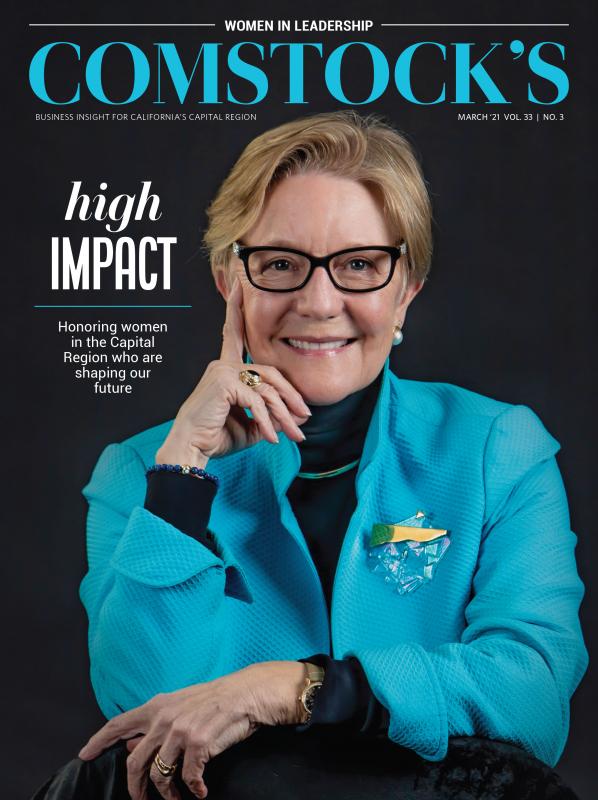Tatyana Bak was 29 years old, an émigré from the city of Odessa in what was then the Union of Soviet Socialist Republics, when in 1989 she helped open a medical clinic that eventually evolved into Elica Health Centers. She’s now the CEO of the collection of medical clinics that delivers care to the working poor, the underserved and uninsured, and those experiencing homelessness, as well as culturally discombobulated arrivals from distant parts of the planet.
When Dr. Alex Janushkowsky, a fellow immigrant from the Soviet Union, opened J Street Medical Center, at first to treat other Russian and Ukrainian immigrants who’d escaped the chokehold of the Iron Curtain, Bak joined him to handle billing and operations. Janushkowsky was the son of an executed military officer in the Russian czar’s army, according to his 2010 obituary in The Sacramento Bee. (Elica still has a J Street office, though not at the same location.)
By then, Bak, who came to the U.S. when she was 15, had worked in the billing department at Mount Zion Hospital in San Francisco, which gave her a grounding in the complexities of medical billing and a deepening understanding of the support programs available to help the poor and underserved. She also says her work as an on-call clerk for a variety of Sacramento County departments, including social services, “gave me insight into poverty and struggle of immigrants and others and what was available to help them. I learned and studied; I am like a sponge,” she says in her still-thick accent (and her sentences remain largely article-free).
“(Working for Sacramento County social services) gave me insight into poverty and struggle of immigrants and others and what was available to help them. I learned and studied; I am like a sponge.”
Tatyana Bak CEO, Elica Health Centers
In 1999, the center was sold to Elizabeth Cassin, and Bak decided to open her own billing and office-setup company for medical professionals. Cassin renamed it Midtown Medical Center and turned it into a nonprofit in 2002. In 2012, Cassin rebranded the expanded organization Elica Health Centers when it became a federally qualified health center (better known as an FQHC in the initialist universe of medicine and government). In 2013, at Cassin’s invitation, Bak returned as chief operating officer, and when Cassin retired in 2017, Elica’s board of directors selected Bak to become CEO.
Elica opened a 20,000-square-foot medical building in North Highlands in November 2020, adding to its 10 health centers in Sacramento and Yolo counties and three mobile clinics. Bak says the mobile units allow Elica to deliver care to farmworkers, laborers and migrants near their homes, encampments or worksites in Sacramento, Placer and Yolo counties. Elica also has an animal care clinic, which Bak says she started after discovering how important pets are to people who are homeless.
Elica treats a wide diversity of clients. “Twenty-five percent of our patient population is Russian,” Bak says, “while 18 percent are Spanish-speaking and another 18 percent are Black. But we also have 5 percent Afghan and 3 percent Asian patients.” Before she can be asked the obvious follow-up question, Bak says, “Yes, we can speak 50 different languages at Elica.” If that sounds like a logistical horror film — just the notion of calling an interpreting service and hoping it can send someone out to a doctor’s office or clinic in a timely way — Bak credits social media and high-tech solutions for allowing her staff to connect with a translator “in about 30 seconds,” by phone or various face-to-face, real-time computer programs.
Elica Health Centers has 11 locations in Sacramento and Yolo
counties, including this one in the Arden Arcade area of
Sacramento. (Photo courtesy of Elica Health Centers)

Elica has received financial support from some of the local health care industry’s most notable providers and players, including the City of Sacramento’s Pathways to Health + Home, Dignity Health, Kaiser Permanente, the Partnership HealthPlan of California, Sierra Sacramento Valley Medical Society Alliance, UC Davis, and Western Health Advantage.
Bak says Elica has many social-service partnerships, including with the Twin Rivers Unified School District. “Elica helps us to take care of our students, with back-to-school inoculations and medical checkups, but also their parents,” says Christi Kagstrom, the district’s coordinator of student health, wellness and prevention.
Another partnership is with the Consulate General of Mexico in Sacramento. Consul General Liliana Ferrer says Elica “has been a fantastic partner in serving our people. It gives them access to health care and removes barriers of fear in the process.” Ferrer says some patients are undocumented and “afraid they’ll go to the doctor then get shipped back to Mexico.” Even when the rest of a patient’s family may be United States citizens, “There’s a fear that if the undocumented patient is forced to leave, it will have a terrible impact on the family.” Ferrer says she was pleased by the arrival of one of Elica’s mobile medical vans “right next to the consulate.” The consulate has also helped Elica take one of its mobile clinics to rural French Camp in San Joaquin County on a regular basis.
Bak says the coronavirus pandemic has affected Elica’s operations. Some of its 445 employees have been working from home, while its 89 doctors, dentists and behavioral health providers continue to visit homeless shelters and gathering spots. “The technology has helped us conduct some routine visits by phone,” she says, “but the care we provide remains very personal. Why else go into this field?”
–
Stay up to date on business in the Capital Region: Subscribe to the Comstock’s newsletter today.
Recommended For You

The Back Story: Back to the Beginning
Tatyana Bak is leading Elica Health Centers’ growth as CEO 30 years after helping to launch a clinic
Tatyana Bak was 29 years old, an émigré from the city of Odessa
in what was then the Union of Soviet Socialist Republics, when in
1989 she helped open a medical clinic that eventually evolved
into Elica Health Centers.

Bridging Health Care Gaps
WellSpace Health CEO Jonathan Porteus on serving the underserved in our communities
WellSpace has operated since 1953 and provides a range of health care services across nearly three dozen sites in Sacramento, Placer and Amador counties. Comstock’s spoke with CEO Jonathan Porteus about how his organization works to achieve regional health.

Status Check: Health Care Hanging On
Local leaders say they’re undaunted by intense fiscal impacts from COVID-19
COVID-19 has presented significant challenges for health care. At least for the moment, though, local providers have been hanging tough and looking toward economic recovery.

Marshall Medical Center CEO Discusses Health Care for Rural Residents
Comstock’s spoke to Marshall Medical Center CEO Siri Nelson about her organization’s efforts to provide quality health care services to residents of El Dorado County.




